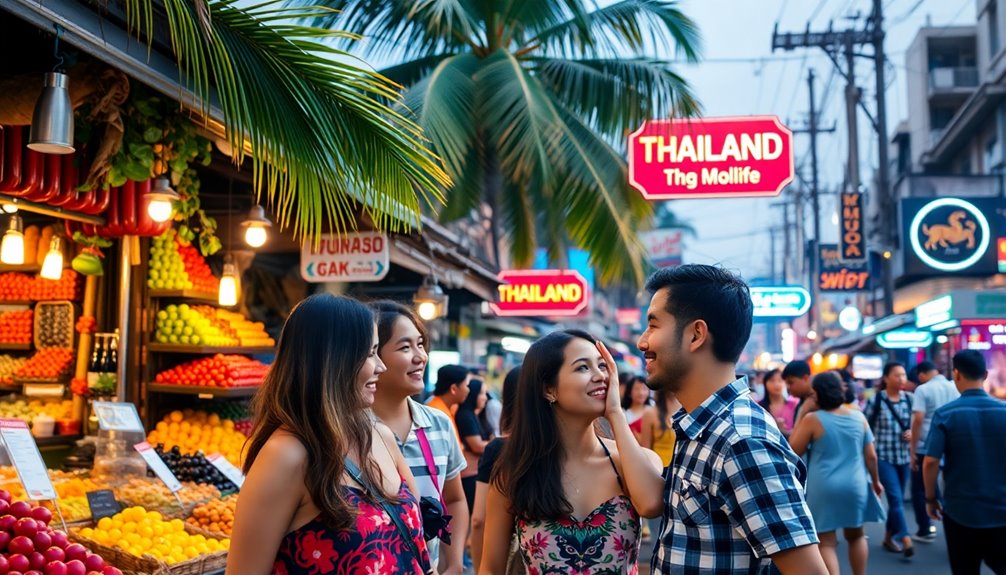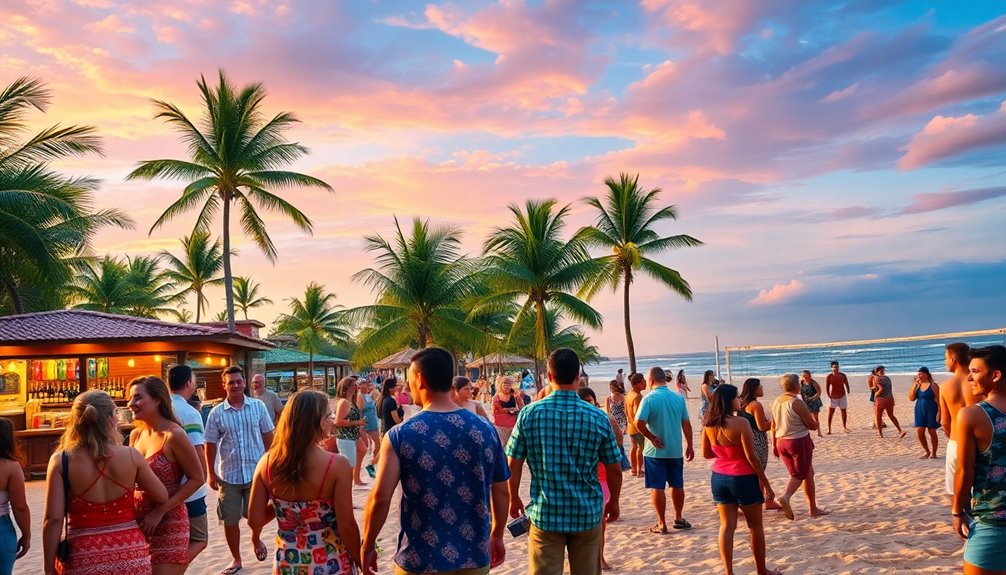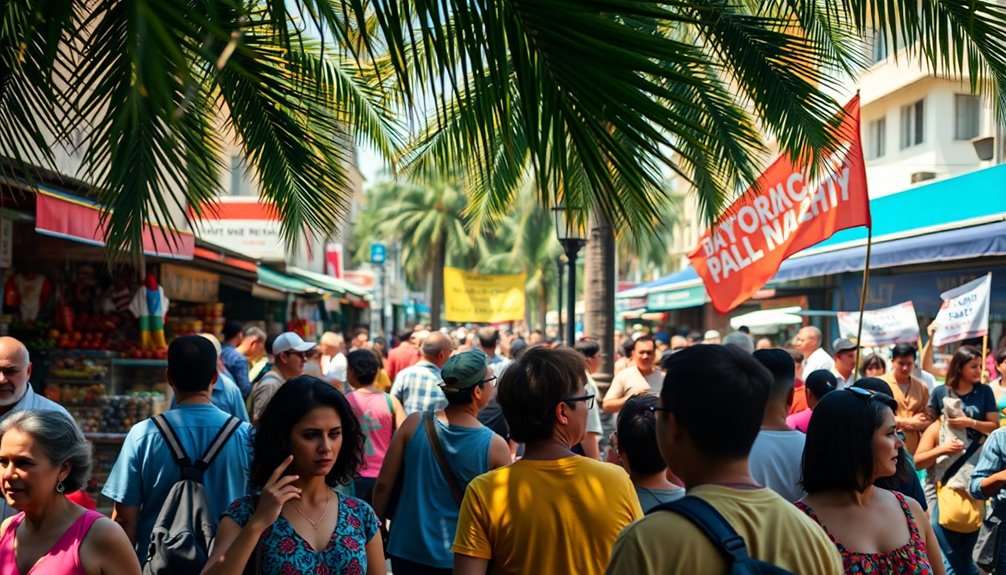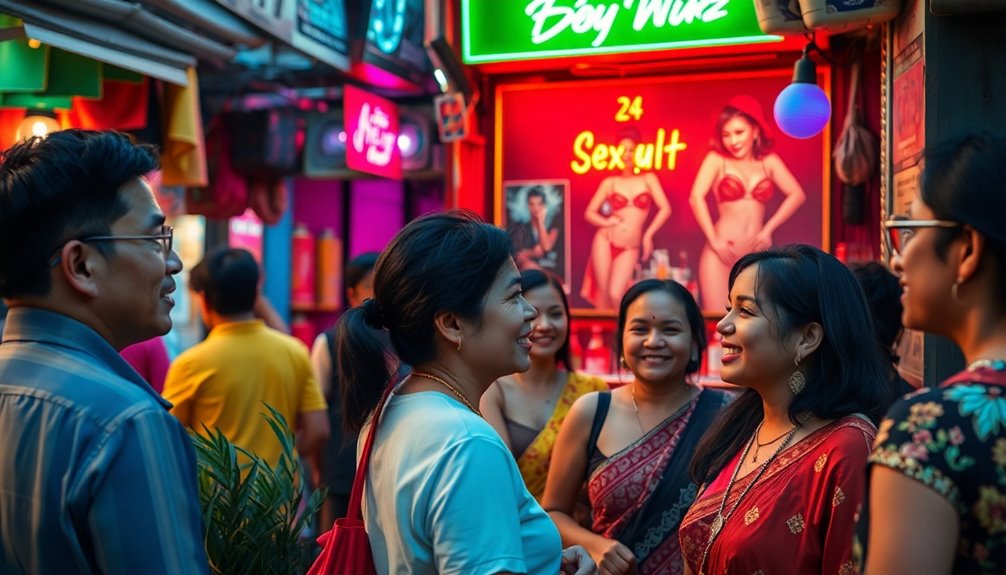If you're looking for the best countries for sex tourism, Thailand, Brazil, and the Netherlands stand out. Thailand offers vibrant scenes in cities like Bangkok and Pattaya, while Brazil's Rio de Janeiro attracts visitors, especially during Carnival. In the Netherlands, Amsterdam's Red Light District provides a regulated environment, emphasizing safety and legal frameworks. Each of these destinations has its unique cultural acceptance and economic opportunity that drives the sex tourism industry. However, they also face significant human rights concerns and exploitation issues. Stick around to explore the deeper implications and dynamics of this complex industry.
Key Takeaways
- Thailand, particularly Bangkok and Pattaya, is renowned for its vibrant and diverse sex tourism scene, attracting millions of tourists annually.
- Brazil, especially during Carnival, experiences a surge in sex tourism fueled by economic disparities and cultural acceptance of sex work.
- The Netherlands, with Amsterdam's regulated Red Light District, provides a safe environment for sex work, making it a popular destination for sex tourists.
- The Dominican Republic is known for its cultural acceptance of sex work, drawing tourists seeking adult entertainment options.
- Cambodia exhibits high rates of paid sex due to economic factors, making it another destination often associated with sex tourism.
Overview of Sex Tourism

Sex tourism is a complex phenomenon that thrives in various parts of the world, often fueled by cultural acceptance and economic factors.
The global sex tourism industry is valued in billions, with millions of sex workers involved in both legal prostitution and illegal activities.
As you explore popular destinations like Thailand, Brazil, and the Dominican Republic, you'll notice that attitudes towards sex work heavily influence the landscape.
In countries such as Cambodia and Thailand, high rates of paid sex among men signal a market deeply entrenched in local culture.
However, this economic reliance can lead to serious issues, including sex trafficking and increased child exploitation.
Understanding these dynamics is essential for anyone interested in the realities behind sex tourism.
Legal Frameworks and Regulations

When considering sex tourism, understanding the legal status of prostitution in various countries is essential.
You'll find that enforcement of sex tourism laws can greatly impact the safety and rights of sex workers.
Additionally, international regulatory efforts play a significant role in shaping these legal frameworks.
Legal Status of Prostitution
Prostitution's legal status varies greatly across different countries, shaping the experiences and rights of sex workers.
In places like Germany and the Netherlands, sex work is legal and regulated, requiring workers to register, pay taxes, and undergo health checks.
Meanwhile, New Zealand's Prostitution Reform Act of 2003 promotes the rights and dignity of sex workers by removing most restrictions on sex work.
In Canada, selling sex is legal, but purchasing it's not, creating a complex legal landscape.
Colombia has legalized prostitution, emphasizing worker rights without criminal penalties, though trafficking remains a challenge.
Australia presents a mixed picture; the legal status of prostitution varies by state, impacting how individuals engage in sex work across the sex industry.
Enforcement of Sex Tourism Laws
While many countries have established laws to regulate sex tourism, enforcement often falls short, leading to a complex web of exploitation and unregulated practices.
Even with legal frameworks in place, such as Ireland's Criminal Law (Sexual Offences) Act 2017, the reality is that inadequate enforcement allows the sex tourism industry to thrive.
- In Thailand, despite specific regulations, human trafficking and sexual exploitation persist.
- The U.S. holds citizens accountable under federal laws when engaging in sex tourism abroad.
- Local NGOs advocate for stronger protections and enforcement against exploitation.
Ultimately, without effective enforcement of sex tourism laws and prostitution laws, the cycle of exploitation continues, leaving vulnerable individuals at risk.
International Regulatory Efforts
Although many countries have established legal frameworks to regulate sex work and combat sex tourism, the effectiveness of these measures varies considerably.
In places like Germany and the Netherlands, the sex trade is legal, with sex workers required to register and follow health standards. Meanwhile, New Zealand's Prostitution Reform Act promotes rights and safety through licensing.
The U.S. imposes strict penalties on American citizens involved in international sex tourism, especially regarding minors. Countries such as Colombia focus on the rights of sex workers while tackling human trafficking.
Local NGOs in regions like Thailand advocate for stronger legal protections against exploitation, highlighting the need for effective enforcement in the fight against human trafficking and ensuring safe sexual services.
Key Destinations for Sex Tourism

When exploring the world of sex tourism, you'll find that certain destinations stand out for their unique offerings and cultural attitudes.
Here are some key locations to examine:
- Thailand: Known for its bustling sex tourism scene, particularly in Bangkok and Pattaya, where millions engage in the industry.
- Rio de Janeiro, Brazil: A hotspot during Carnival, fueled by economic disparities and cultural acceptance of consensual sex.
- Amsterdam: Famous for its legalized and regulated sex work in the Red Light District, attracting tourists with its safety standards.
These destinations exemplify diverse approaches to sex tourism, highlighting how different cultures view and regulate the practice, contributing to vibrant experiences for visitors.
Economic Impact on Local Communities

When you explore the economic impact of sex tourism, you'll find that many communities heavily rely on the income it generates.
This sector creates job opportunities across various fields, from hospitality to entertainment, but it also affects local prices and availability of goods.
Understanding these dynamics is essential as they shape both the local economy and the lives of residents.
Economic Reliance on Tourism
While many countries benefit from a thriving tourism industry, the economic reliance on sex tourism can markedly shape local communities. In popular destinations like Thailand and Brazil, this multibillion-dollar industry supports millions, yet often perpetuates human trafficking and exploitation.
- Red-light districts thrive as millions flock for paid sexual encounters.
- Economic disparities in developing nations drive locals to sex work for survival.
- Events like Brazil's Carnival further entrench this reliance, amplifying both tourism and the sex trade.
As you explore these vibrant locales, consider the complex dynamics at play. While tourism brings economic benefits, it can also lead to significant social challenges that impact local communities in profound ways.
Job Creation Opportunities
The economic landscape of countries heavily reliant on sex tourism reveals both challenges and opportunities. While sex tourism generates significant economic activity, creating job offers in hospitality and entertainment, it also raises ethical concerns.
In places like Thailand and Brazil, local economies thrive on the influx of visitors, sustaining a network of businesses. However, this dependence often leads to exploitation, with many individuals entering the sex trade due to economic disparities.
These jobs may provide necessary income, but they can also compromise human rights. As local communities navigate these complexities, it's crucial to balance economic benefits with the need for ethical practices that protect vulnerable populations in the sex tourism industry.
Impact on Local Prices
As sex tourism boosts local economies, it often leads to rising prices for everyday goods and services. This economic impact can be particularly noticeable in popular tourist destinations where demand surges, affecting locals' cost of living.
- Restaurants may increase menu prices to cater to tourists.
- Rent for housing can spike in high-traffic areas, making it tough for locals.
- Basic goods like groceries may see a rise in costs due to the influx of visitors.
These changes often reflect the economic disparities within the community, pushing some residents into sex work as a means of survival.
While sex tourism generates revenue, it can create a challenging environment for local populations, altering the fabric of everyday life.
Human Rights Concerns

Human rights concerns surrounding sex tourism are critical, especially since marginalized groups often bear the brunt of exploitation. Many sex workers come from low-income backgrounds, lacking viable alternatives, which heightens their vulnerability.
The alarming reality of child sex tourism affects approximately 2 million children globally, marking a severe violation of their rights and dignity. Human trafficking for sexual exploitation remains a significant issue, with victims enduring long-term psychological and physical consequences.
Advocacy efforts aim to protect these vulnerable populations and raise awareness about the implications of such human rights violations. Reports show a direct link between increased tourism and child prostitution, emphasizing the urgent need for stronger legal protections and community initiatives to combat these pressing concerns.
Cultural Attitudes Towards Sex Work

Cultural attitudes towards sex work shape not only the lives of those involved but also the broader societal context in which they operate. In places like the Netherlands and Germany, you'll find legal and regulated prostitution, fostering a liberal environment.
Meanwhile, in Thailand and Brazil, cultural perceptions of sex work often accept it as an economic necessity for struggling families, despite the risks of sexual trafficking.
- Red Light Areas thrive as tourist destinations, attracting sex tourists.
- Stricter laws in developed countries prioritize victim protection.
- Economic factors can push vulnerable individuals into sex work.
These varying attitudes influence local economies and the experiences of both sex workers and tourists, creating a complex global landscape.
Frequently Asked Questions
What Is the Safest Country for Sex Tourism?
If you're wondering about the safest country for sex tourism, you'll want to take into account places with strong regulations and protections for sex workers.
Countries like the Netherlands and Germany offer extensive legal frameworks that promote safety and health standards.
New Zealand's Prostitution Reform Act also guarantees the rights of sex workers.
While Canada and Australia have mixed regulations, they can still provide safer environments depending on the region and local laws.
Which Latin Country Is Best for Sex Tourism?
When you're considering which Latin American country is best for sex tourism, you might find Colombia stands out.
With vibrant cities like Medellín and Cartagena, you can explore a mix of culture and nightlife while enjoying a legal environment for sex work.
Brazil also offers beautiful beaches and a lively atmosphere, especially in Rio.
Ultimately, your choice depends on your preferences for culture, scenery, and experiences you seek during your travels.
What Is Sex and Travel?
Did you know that around 75% of men in Thailand engage in paid sex while traveling?
Sex and travel often intertwine, as some travelers seek out sexual experiences as part of their journey.
You might find that exploring different cultures and their attitudes towards sex can be intriguing.
Whether you're curious about local customs or looking to connect with people, this aspect of travel can add a unique layer to your adventures.
What Is the Meaning of Sex Vacation?
A sex vacation means you're traveling primarily to engage in sexual activities.
It's about exploring new experiences and cultures while fulfilling your desires.
You might find yourself in places where sexual services are more accessible and culturally accepted.
This type of vacation often combines adventure with the thrill of uninhibited encounters, allowing you to enjoy both exotic travel and intimate connections.
It's a unique way to satisfy curiosity and indulge in pleasure.
Conclusion
While some might argue that sex tourism exploits vulnerable populations, it's important to recognize that in certain regions, it can provide income and opportunities for local workers. By choosing to engage responsibly and ethically, you can contribute to a more sustainable form of tourism that respects rights and dignity. So, if you're considering a trip, educate yourself on the local context and support initiatives that empower those involved in the industry. Your choices can make a difference!










